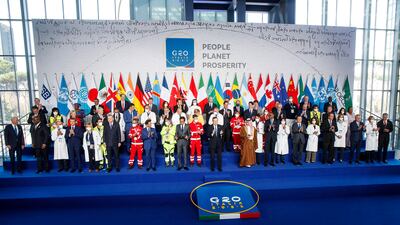Boris Johnson has compared the risks of climate change to the fall of the Roman Empire, as the UK Prime Minister said a failure to act could see civilisation swiftly going backwards.
G20 leaders are meeting in Rome at the weekend, with global warming a key talking point.
Nearly 200 world leaders and around 20,000 delegates will also gather in Glasgow, Scotland, from Sunday for the Cop26 UN climate conference.
Mr Johnson said it would be “very, very tough” to get the agreements needed to slow the temperature rise.
A leaked draft of the final G20 communique said they would enhance effort to limit global warming to 1.5°C above pre-industrial levels.
This is generally regarded as the level necessary to avoid the most severe effects of climate change.
“Humanity, civilisation and society can go backwards as well as forwards, and when they start to go wrong, they can go wrong at extraordinary speed,” Mr Johnson said in Rome.
“Unless we get this right in tackling climate change, we could see our civilisation, our world, also go backwards.
“You saw that with the decline and fall of the Roman Empire.”
Mr Johnson has not struck an optimistic tone in the lead-up to the conference, saying in Rome that he still rated the chances of success in Glasgow as no more than six out of 10.
G20 countries account for around 80 per cent of global emissions and the world's gross domestic product.
“From the pandemic, to climate change, to fair and equitable taxation, going it alone is simply not an option,” said the host of the G20 talks, Italian Prime Minister Mario Draghi.
A draft communique seen by Reuters said leaders are set to pledge to halt financing of overseas coal-fired power generation by the end of this year, and to “do our utmost” to stop building new coal power plants before the end of the 2030s.
But G20 members, many at different stages of economic development, remain at odds over the goal of reducing greenhouse gas emissions to net zero by 2050.
Climate is expected to feature more prominently at the G20 talks on Sunday, with the first day largely focused on Covid-19 and the economic recovery.
Leaders are also expected to approve a global minimum corporation tax of 15 per cent.






















